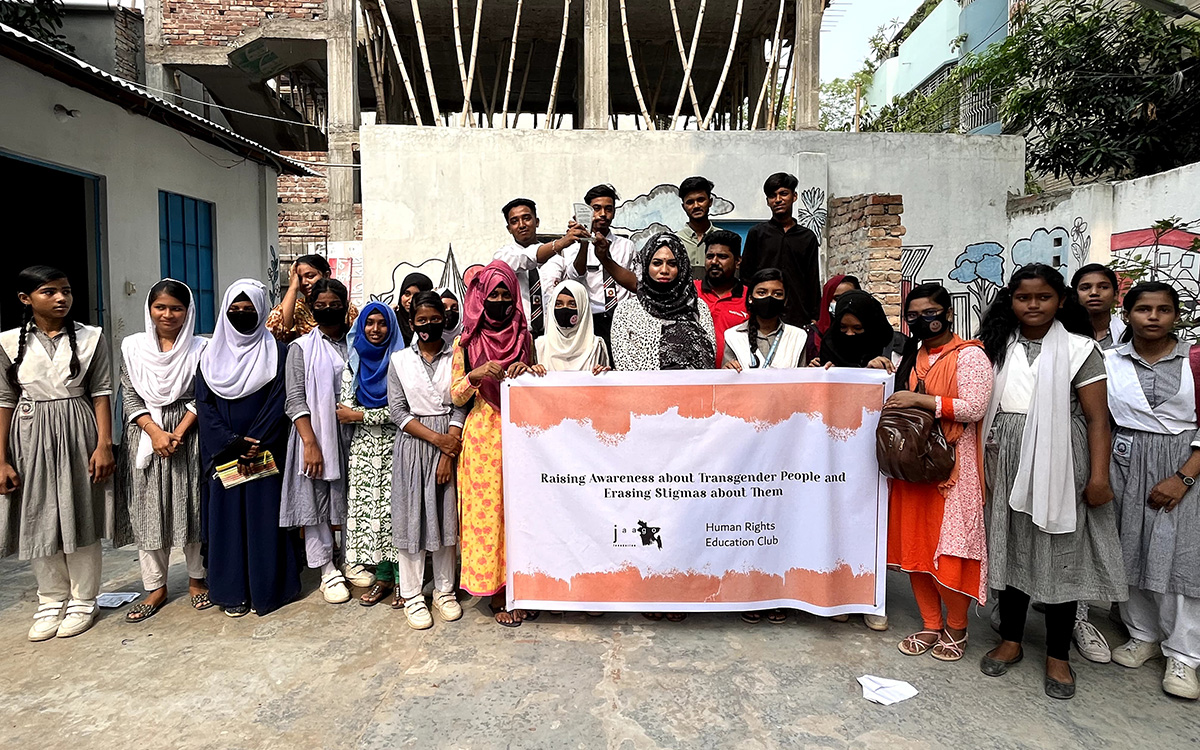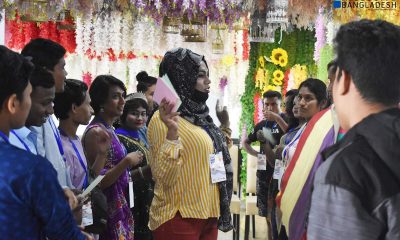Bangladesh
LGBTQ+ Bangladeshis increasingly vulnerable a year after government toppled
Protests forced then-Prime Minister Sheikh Hasina to resign in August 2024

Tuesday marks one year since former Prime Minister Sheikh Hasina resigned and fled Bangladesh, triggering a political crisis that unleashed widespread unrest. The country since her ouster has faced a surge in mob violence and lynchings, with the LGBTQ+ community at the epicenter.
The Los Angeles Blade reported in August 2024 the collapse of public order forced many in this marginalized group into hiding, seeking refuge in safe houses as vigilante attacks intensified. A year later, as the country grapples with ongoing instability and a weakened law enforcement system — marked by a 30 percent vacancy rate in police positions — the experiences of the LGBTQ+ community offer a stark measure of Bangladesh’s social and political recovery.
Tushar Kanti Baidya, program director of Inclusive Bangladesh, an LGBTQ+ advocacy organization, told the Blade the landscape for LGBTQ+ rights in Bangladesh has shifted since the 2024 political crisis. Unfortunately, Baidya said, this change has taken a deeply concerning direction.
“Over the past decade, we have worked hard to build positive visibility for LGBTQ individuals, particularly transgender persons. However, that progress is now under threat due to the increasing influence of right-wing political groups and their allies,” said Baidya. “These groups continue to deny the legitimacy of transgender identities and are actively engaged in coordinated campaigns against the broader LGBTQ community.”
“The hostile environment has resulted in widespread discrimination, harassment, and violence. Transgender individuals, in particular, are being targeted, facing physical assault, bullying, and restrictions in continuing their traditional professions,” noted Baidya. “Even those who have contributed significantly to human rights efforts are not spared.”
Baidya said Sanjiboni Sudha, the group’s executive director, was “consistently harassed and pressured to resign from her position” at BRAC bank, a financial institution affiliated with BRAC, a prominent NGO.
“Despite reaching out to the bank’s general manager and BRAC’s executive director, Mr. Asif Saleh, we received no substantive response,” Baidya told the Blade. “The matter was ultimately dismissed as an ‘internal issue’ of the bank.”
Baidya said Sanjiboni lost her scholarship at the University of Dhaka after the sudden abolition of the trans quota, with no follow-up guidance to address the decision’s impact. Baidya added another colleague, Saraban Tahura, was denied a contract renewal at Walton Group, a private company, while her cisgender colleagues in similar roles were retained.
“Members of our community who openly supported a new political party were expelled from its committees once their sexual or gender identity became public,” Baidya told the Blade. “Incidents of blackmail, hate crimes, and even killings have escalated significantly.”
“As a result of this widespread and systemic backlash, many members of the LGBTQ community in Bangladesh have been forced into silence, living in fear, and waiting for a safer and more inclusive future,” added Baidya.
Mohammad Rafiqul Islam, a gay man, was brutally murdered in Gazipur, a city just north of Dhaka, Bangladesh’s capital, on July 19.
The killing, described by JusticeMakers Bangladesh in France, a Paris-based human rights organization, as premeditated, has intensified fears among marginalized groups.
JusticeMakers Bangladesh in France’s 2024 report documents a sharp rise in violence against Bangladesh’s LGBTQ+ community.
The report noted that following the fall of Hasina’s government and the formation of an interim administration led by Nobel laureate Muhammad Yunus, Islamist fundamentalist groups gained significant influence. Exploiting the ensuing political instability, these groups unleashed a wave of attacks on LGBTQ+ people, exacerbating the community’s vulnerability amid a deteriorating security landscape.
Baidya told the Blade that under Hasina’s administration, minority communities — religious, sexual, gender, and ethnic groups — benefited from inclusive policies and targeted social safety programs. Hasina’s government, he said, showed a clear commitment to supporting marginalized groups through institutional measures and public acknowledgment, fostering a more protective environment before the 2024 political upheaval.
“In contrast, the current interim government has yet to demonstrate any meaningful action to uphold or continue these protections.,” said Baidya. “There has been no clear initiative or policy commitment aimed at safeguarding the rights of minority groups, leaving these communities in a state of uncertainty and heightened vulnerability. This lack of proactive engagement from the present leadership is particularly concerning, as it signals a potential regression in the hard-won progress made toward equality and inclusion in Bangladesh.”
Hasina’s government from 2013-2021 enacted several trans-inclusive policies, notably granting legal recognition to the trans community as a third gender in 2013 for official documents, including passports and voter ID cards. These measures enabled trans people to apply for government jobs and vote under their recognized gender identity.
Bangladesh also became one of the few South Asian countries to offer tax rebates to companies employing trans people, bolstering economic inclusion before Hasina’s government fell.
The Yunus-led interim government has not introduced any policies to advance LGBTQ+ inclusion, aligning instead with conservative and Islamist political groups, some known for actively opposing LGBTQ+ rights. The administration lifted a ban on Jamaat-e-Islami, a conservative Islamist party with a history of resisting LGBTQ+ protections.
“There have been widespread allegations suggesting that the recent anti-government protests were indirectly supported by foreign actors, particularly the United States,” noted Baidya. “Claims have emerged that USAID (U.S. Agency for International Development)-funded certain individuals and NGOs with the intention of promoting an agenda aimed at unseating the previous government.”
“It is well-documented that Professor Muhammad Yunus, a central figure in the current political transition, has maintained strong ties with previous U.S.-aligned democratic administrations,” he added. “Given this context, it is unlikely that the current Republican-led U.S. government will significantly alter its position, especially if the current political arrangement serves broader strategic or geopolitical interests.”
Baidya told the Blade that Yunus’s government has persued policies that undermine LGBTQ+ peoples’ fundamental rights. Rather than fostering inclusion or dialogue, he said the current government has intensified measures that marginalize and dehumanize sexual and gender minorities, deepening their exclusion amid Bangladesh’s volatile political landscape.
“This inconsistency highlights a troubling double standard, where political rhetoric is used to gain power, but once in control, the same government disregards human rights and fails to protect the very communities it previously criticised others for engaging with,” said Baidya, who added women and trans activists in particular have become targets.
“Many have been forced to relocate within the country after receiving credible threats of abduction, sexual violence, and even death,” he said. “These threats have created a climate of fear and forced many into silence or isolation.”
Baidya told the Blade that trans Bangladeshis are under increased pressure to conceal their gender identity.
Prominent community members, once visible in public and advocacy spaces, have sharply curtailed their activities due to safety concerns. Those with resources or international connections, Baidya noted, are increasingly seeking to leave the country in pursuit of safety and dignity.
He said Inclusive Bangladesh receives up to 10 requests for support and relocation assistance each week. Baidya told the Blade that restrictive visa policies in the U.S. and European countries have left many LGBTQ+ Bangladeshis in limbo.
Neither Hasina nor her political party, the Bangladesh Awami League, have returned the Blade’s request for comment.
“Currently, no major political party has openly expressed support for LGBTIQ+ rights,” said Baidya. “In the absence of political backing, our only path forward is to persist through strategic advocacy, community engagement, and policy lobbying. We must continue working tirelessly to ensure that the rights of LGBTIQ+ people are eventually recognized, respected, and institutionalized.”

-

 LGBTQ+ Youth Mental Health3 days ago
LGBTQ+ Youth Mental Health3 days agoFor queer youth, LGBTQ+ scholarships affirm their visibility and sense of possibility
-

 Books4 days ago
Books4 days agoThe social side of self-pleasure: Artist Jason Wimberly presents his newest book of photography, HOMOSOCIAL
-

 Obituary3 days ago
Obituary3 days agoAppreciating literature’s gay genius, Michael Silverblatt
-

 a&e features2 days ago
a&e features2 days agoTaylor Tookes wants you to be your own beauty standard
-

 Television1 day ago
Television1 day agoSexy financial drama ‘Industry’ is feeding the queer community
-

 Movies4 days ago
Movies4 days agoMoving doc ‘Come See Me’ is more than Oscar worthy
-

 Books8 hours ago
Books8 hours agoLove or fear flying you’ll devour ‘Why Fly’





